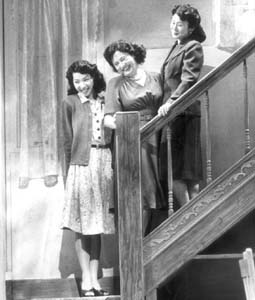![[Metroactive Stage]](/stage/gifs/stage468.gif)
[ Stage Index | Metro | Metroactive Central | Archives ]
Family Ways
 Stairway to Reconciliation: Rose (left, Sala Iwamatsu), Chiz (Lisa Li) and Grace (Kim Miyori) are 'The Sisters Matsumoto.'
Stairway to Reconciliation: Rose (left, Sala Iwamatsu), Chiz (Lisa Li) and Grace (Kim Miyori) are 'The Sisters Matsumoto.'
The Japanese-American experience after internment is explored in SJ Rep's 'The Sisters Matsumoto' By Heather Zimmerman THE OLD EXPRESSION "you can't go home again" takes on troubling new dimensions in Philip Kan Gotanda's The Sisters Matsumoto. For the three Matsumoto sisters, Japanese-Americans returning from an internment camp at the end of World War II, "home" denotes everything from the family farm to their perception of America, beloved adopted homeland of the late Matsumoto patriarch. Whether it's home in the literal or metaphorical sense, the sisters find everything too changed to go back to the way it was. Gotanda's play makes its world premiere in an engrossing production by the San José Repertory Theatre, presented in collaboration with the Seattle Repertory Theatre and the Asian American Theatre Company. At the end of the war, the Matsumoto sisters, Grace (Kim Miyori), Chiz (Lisa Li) and Rose (Sala Iwamatsu), and their own families, Grace's husband, Hideo (Nelson Mashita), Chiz's husband, Bola (Stan Egi), and their baby, return to the family farm in Stockton after being released from the Rohwer camp in Arkansas. The farm has fallen into disrepair and anti-Japanese sentiment runs rampant. The house seems empty and strange to Grace, Chiz and Rose without their father, who died at the camp. Although they find their own hometown hostile, the sisters decide that staying to rehabilitate the farm to its former prosperity will help return everything to "normal." It doesn't take long, however, for bitterness, both outside and within the family, to demonstrate the irreversible changes that have transformed their world. Cruel confrontations abound, even at the genteel country club, where Bola and Chiz are goaded that they "started it all" with the bombing of Pearl Harbor. And the family itself is quietly but painfully divided on issues of patriotism, as were groups in the camps. Hideo is very much pro-Japan and voices his distrust of the U.S. government, while Grace remains true to her father's profound loyalty to the U.S., even after it was hobbled by their imprisonment. With such diverse points of view within the family, Gotanda explores the myriad issues behind the question of what it means to be American, the struggle to reconcile heritage and culture. Grace, Chiz and Rose are nisei, second-generation Japanese-Americans. Born in the U.S., they are citizens who feel betrayed by their imprisonment, a feeling made more intense by the sisters' having been raised on their father's unwavering patriotism. This painful rift shows most clearly in Grace, who is torn, in her role as the "dutiful" eldest daughter, between standing up for her late father's wishes and lashing out at the country that has brought her family so much pain, and Miyori gives a strong portrayal of Grace's inner struggle. Director Sharon Ott helms an excellent ensemble cast who turn in remarkable performances which walk a very nuanced line between rage and reconciliation (and occasionally, revelry) as the family tries to heal and go on with life. With The Sisters Matsumoto, Gotanda offers a vivid illustration of the dichotomy between ideals and realities that has come to be part of the American experience.
The Sisters Matsumoto plays this week Tuesday-Friday at 8pm, Saturday at 3 and 8pm, Sunday at 2 and 7pm at the San José Repertory Theatre, 101 Paseo de San Antonio, San Jose. The show ends May 23. Tickets are $16- $32. (408/291-2255). [ San Jose | Metroactive Central | Archives ]
|
From the May 6-12, 1999 issue of Metro.
Copyright © Metro Publishing Inc. Maintained by Boulevards New Media.